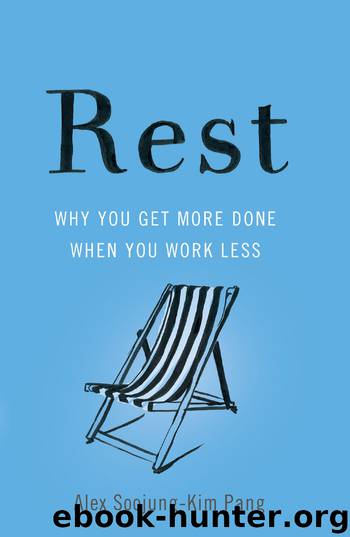Rest by Alex Soojung-Kim Pang

Author:Alex Soojung-Kim Pang
Language: eng
Format: epub, azw3
ISBN: 9780465096596
Publisher: Basic Books
Published: 2016-10-30T16:00:00+00:00
EISENHOWER’S TIME AT Telegraph Cottage serves as a model of recovery theory, which explains why it was so valuable in helping him recover from the pressures of his first command. It was a space where Eisenhower could exercise mastery in long bridge games (a game he played brilliantly) or relax over novels and golf (“Ike’s [golf] score is a military secret,” Butcher joked, suggesting that for Eisenhower, golf was more relaxation than mastery). Cottage life also gave him a chance to exercise a rare level of control over his time (he sometimes took over the kitchen to cook his own breakfast, though his aide drew the line at letting the boss do the dishes).
More important, its location helped Eisenhower recover from work. Except for the “bomb holes on the golf course” adjacent to the cottage, Butcher said, it was “so peaceful you’d never know there [was] a war.” When he arrived to take up his new post, Eisenhower quickly discovered that the Dorchester Hotel offered no escape from work: a number of senior ministers and British military leaders were living in the hotel, thanks in part to its modern construction and reputation as bombproof and fireproof. In contrast, Telegraph Cottage was private, and Eisenhower and his staff worked to make sure it remained so. Eisenhower kept its location a secret from all but his closest aides. He didn’t entertain guests or make deals over rounds of golf on the nearby course. He didn’t bring work there, and Butcher and Bedell Smith avoided shop talk. Aside from his dog (who, revealingly, was named Telek, an abbreviation of “Telegraph Cottage”), the cottage and the life he maintained there was Eisenhower’s great respite from the war, a key to staying sharp and recovering from the pressures of the job.
The story of Telegraph Cottage should remind us that even people in very high-stakes jobs need to set aside time for recovery. It’s easy to forget that we need to build rest into our schedule. It’s easy to convince ourselves that detaching from work is impossible. We live in an era when we’re urged to be passionate about our work, to regard the boundary between work and life as an obsolete relic of the industrial age. Mobile technologies keep us connected to the workplace day and night. At the same time, the boundaries between work and life are blurred, giving us more flexibility and choice about how to organize our time. Together, they create the illusion that we’ll find greatest fulfillment, and be most effective, if we’re always working.
But that’s wrong. The positive effects of time off from work, of being able to completely leave the cares and pressures (and even the positives) of the workplace behind, are by now too well-documented to ignore, as are the negative effects of burnout. The literature on vacations and recovery show that individuals, job performance, and companies all benefit from time out of the office. The most creative and most productive workers are the ones who are able
Download
This site does not store any files on its server. We only index and link to content provided by other sites. Please contact the content providers to delete copyright contents if any and email us, we'll remove relevant links or contents immediately.
Rewire Your Anxious Brain by Catherine M. Pittman(18630)
Talking to Strangers by Malcolm Gladwell(13338)
The Art of Thinking Clearly by Rolf Dobelli(10405)
Mindhunter: Inside the FBI's Elite Serial Crime Unit by John E. Douglas & Mark Olshaker(9308)
Becoming Supernatural by Dr. Joe Dispenza(8194)
Change Your Questions, Change Your Life by Marilee Adams(7728)
Nudge - Improving Decisions about Health, Wealth, and Happiness by Thaler Sunstein(7687)
The Road Less Traveled by M. Scott Peck(7581)
The Lost Art of Listening by Michael P. Nichols(7485)
Mastermind: How to Think Like Sherlock Holmes by Maria Konnikova(7312)
Enlightenment Now: The Case for Reason, Science, Humanism, and Progress by Steven Pinker(7303)
Win Bigly by Scott Adams(7181)
The Way of Zen by Alan W. Watts(6589)
Daring Greatly by Brene Brown(6500)
Big Magic: Creative Living Beyond Fear by Elizabeth Gilbert(5739)
Grit by Angela Duckworth(5591)
Ego Is the Enemy by Ryan Holiday(5406)
Men In Love by Nancy Friday(5225)
The Laws of Human Nature by Robert Greene(5153)
